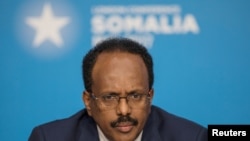Somalia’s international partners, including the United States, have raised concerns about the political impasse that has delayed the country’s presidential and parliamentary elections.
President Mohamed Abdullahi Farmajo four-year term in office expired on Monday, February 8, and the coalition of the opposition presidential candidates through their spokesman Ridwan Hajji said they will not recognize Farmajo as the head of state.
“Mohamed Abdullahi Farmajo must respect the constitution and give up his responsibilities as the head of state," Hajji said. "We call on all stakeholders or participants in political process to build a transitional council that includes the presidents of the people’s assembly.”
However some lawmakers like Abdi Shire believe the Farmajo is still legally president until he is replaced or re-elected, as per a resolution approved the two houses of parliament last year.
Shire said the existing resolutions passed by the national assembly say that if elections are not conducted in the stipulated time, all the constitutional office holders including the President will be in power until they are replaced through elections.
Somalia was scheduled to hold indirect parliamentary elections late last year before president elections in February.
But the process has been held up by disagreements between political stakeholders on who will serve on the commission overseeing the polls.
Professor Afyare Elmi is associate professor of Security Studies at Qatar University. He said if both sides do not conduct themselves in a mature manner, there might be security setbacks in Somalia in coming weeks.
On Sunday, 12 members of Somalia’s security forces were killed in an explosion near the town of Dhusamareb. Al-Shabab militants claimed responsibility.
“The security implications could be problematic if there is no solution within the next few weeks because there is polarization within the political class and for the last four years the president and his administration was not helpful in terms of managing the diversity of Somali political groups,” Elmi said.
President Farmajo made no comments Monday but on Saturday he addressed the parliament, saying his administration will try to implement a September agreement on holding the elections. That implies he will remain in office until parties can agree on a way to choose his successor.




